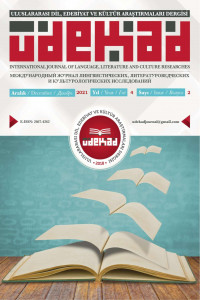Abstract
Mary Shelley’nin Frankenstein ya da Modern Prometheus eseri 19. yüzyılın ve spekülatif kurgunun en çok bilinen romanlarından biridir. Roman, insan deneyiminin derinliklerine doğru felsefi bir yolculuğu temsil etmektedir. Romanın çeşitli tema ve meselelerle odaklandığı halde, bu araştırma temel olarak Frankenstein’da Donkişotluk ve Donkişotvari idealizm kavramlarını ele almaktadır. Makalenin temel amacı, metne yapılan göndermelerle, Victor Frankenstein’ın Donkişotvari idealizminin ahlak dışı eylemler aracılığıyla ahlakı nasıl ortadan kaldırdığını ve bunun karakterin çöküşüne yol açtığını açığa çıkarmaktır. Makalenin kuramsal çerçevesinde Donkişotluk kavramı, Cervantes’in zamana meydan okuyan romanı, Don Kişot’a yapılan referanslarla irdelenmektedir. Don Kişot’a ek olarak, Kant’ın ahlak anlayışı, düşünürün “koşulsuz buyruk” kavramına yapılan vurgu ile incelenmektedir. Bu bağlamda, araştırma Victor Frankenstein’ın Donkişotluğunu Don Kişot figürü ile karşılaştırarak pek çok benzerlik gözlemlemekte ve eşdeğer karakterler olarak, her iki kişiliğin eylemlerinin ahlaki kaygılardan yoksun oldukları sonucuna varılmaktadır. Sonuç olarak makale, irrasyonellik ve ahlak dışılığın, Donkişotvari idealizmin birer sonucu olduklarını ve bu sonucun felakete yol açtığını dışa vurmaktadır.
References
- Close, A. (1978). The Romantic Approach to 'Don Quixote': A Critical History of the Romantic Tradition in 'Quixote' Criticism. Cambridge: Cambridge University Press.
- De Madariaga, S. (1928). Our Don Quixote. Hispania, 11(2), 91. doi:10.2307/331755
- Gordon, S. P. (2006). The Practice of Quixotism: Postmodern Theory and Eighteenth-Century Women's Writing. Palgrave Macmillan.
- Johnson, C. B. (1983). Madness and Lust: A Psychoanalytical Approach to Don Quixote. Berkeley: University of California Press.
- Kant, I. (2002). Groundwork for the Metaphysics of Morals. J. B. Schneewind (Ed.). Yale University Press.
- LaLonde, S. (2017). Don Quixote’s quixotic trauma therapy: A reassessment of Cervantes’s canonical novel and trauma studies. Open Cultural Studies, 1(1), 244-256. doi:10.1515/culture-2017-0022
- Montefiore, A. (2003). Kant and the categorical imperative. Think, 2(5), 75-82. doi:10.1017/s1477175600002645
- Paton, H. J. (1971). The Categorical Imperative: A Study in Kant's Moral Philosophy. University of Pennsylvania Press.
- Pronkevych, O. (2016). Quixotic imagery in ideological Mythmaking. Kyiv-Mohyla Humanities Journal, 0(3), 187-196. doi:10.18523/kmhj73953.2016-3.187-196
- Schmidt, P. J. (2017). Madness in the Quijote: Don Quijote as Alonso Quijano's True Self (Unpublished master's thesis). Brigham Young University, Salt Lake City, UT.
- Shelley, M. (2019). Frankenstein. İstanbul: MK Publications.
- Sullivan, R. J. (1994). An Introduction to Kant's Ethics. Cambridge: Cambridge University Press.
- Thomas E. Hill, J. (2009). The Blackwell Guide to Kant's Ethics. Wiley-Blackwell.
- Unanumo, M. D. (1967). Quixotism. In Selected Works of Miguel de Unamuno, Volume 3: Our Lord Don Quixote (pp. 329-441). Princeton: Princeton University Press.
Abstract
Mary Shelley’s Frankenstein or the modern Prometheus is one of the most celebrated novels of the 19th century and of speculative fiction. The novel represents a philosophical journey to the inner depths of the human experience. While the novel focuses on a variety of issues and themes, this study mainly deals with the notion of “Quixotism” and “Quixotic idealism” in Frankenstein. This article’s main purpose is to reveal, with specific references to the text, how Victor Frankenstein’s quixotic idealism destroys morality by engaging into immoral acts and eventually leading to his catastrophic downfall. In the theoretical framework, the notion of quixotism is elaborated with references to Cervantes’ timeless novel, Don Quixote. In addition to quixotism, Kantian morality is presented with emphasis on the philosopher’s concept of “the categorical imperative”. To this end, the study compares Victor Frankenstein’s quixotism to Don Quixote’s and observing many resemblances, it draws the conclusion that both are equivalent characters whose actions are void of moral concerns. Finally, the article also aims to expose that irrationality and immorality are the consequences of quixotic idealism which result in disastrous consequences.
References
- Close, A. (1978). The Romantic Approach to 'Don Quixote': A Critical History of the Romantic Tradition in 'Quixote' Criticism. Cambridge: Cambridge University Press.
- De Madariaga, S. (1928). Our Don Quixote. Hispania, 11(2), 91. doi:10.2307/331755
- Gordon, S. P. (2006). The Practice of Quixotism: Postmodern Theory and Eighteenth-Century Women's Writing. Palgrave Macmillan.
- Johnson, C. B. (1983). Madness and Lust: A Psychoanalytical Approach to Don Quixote. Berkeley: University of California Press.
- Kant, I. (2002). Groundwork for the Metaphysics of Morals. J. B. Schneewind (Ed.). Yale University Press.
- LaLonde, S. (2017). Don Quixote’s quixotic trauma therapy: A reassessment of Cervantes’s canonical novel and trauma studies. Open Cultural Studies, 1(1), 244-256. doi:10.1515/culture-2017-0022
- Montefiore, A. (2003). Kant and the categorical imperative. Think, 2(5), 75-82. doi:10.1017/s1477175600002645
- Paton, H. J. (1971). The Categorical Imperative: A Study in Kant's Moral Philosophy. University of Pennsylvania Press.
- Pronkevych, O. (2016). Quixotic imagery in ideological Mythmaking. Kyiv-Mohyla Humanities Journal, 0(3), 187-196. doi:10.18523/kmhj73953.2016-3.187-196
- Schmidt, P. J. (2017). Madness in the Quijote: Don Quijote as Alonso Quijano's True Self (Unpublished master's thesis). Brigham Young University, Salt Lake City, UT.
- Shelley, M. (2019). Frankenstein. İstanbul: MK Publications.
- Sullivan, R. J. (1994). An Introduction to Kant's Ethics. Cambridge: Cambridge University Press.
- Thomas E. Hill, J. (2009). The Blackwell Guide to Kant's Ethics. Wiley-Blackwell.
- Unanumo, M. D. (1967). Quixotism. In Selected Works of Miguel de Unamuno, Volume 3: Our Lord Don Quixote (pp. 329-441). Princeton: Princeton University Press.
Details
| Primary Language | English |
|---|---|
| Subjects | British and Irish Language, Literature and Culture |
| Journal Section | Research Articles |
| Authors | |
| Early Pub Date | December 27, 2021 |
| Publication Date | December 31, 2021 |
| Submission Date | June 2, 2021 |
| Acceptance Date | August 18, 2021 |
| Published in Issue | Year 2021 Volume: 4 Issue: 2 |
* It is important for our referees to enter their fields of expertise in detail in terms of assigning referees in the process.
* The articles sent to our journal can only be withdrawn by giving reasons during the preliminary evaluation process. It is not possible to withdraw the articles that have started the evaluation process. Thank you for your understanding and we wish you good work.


